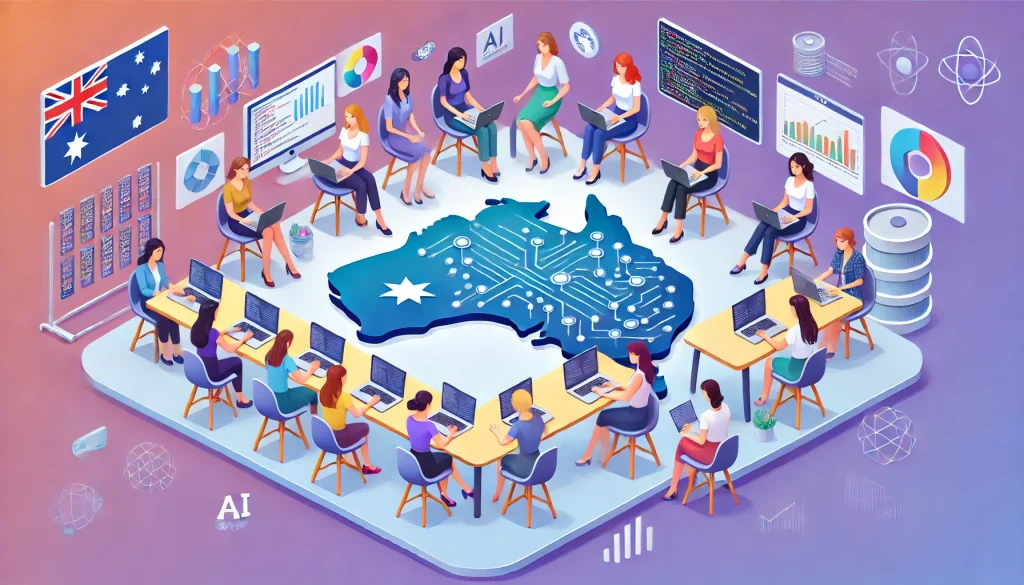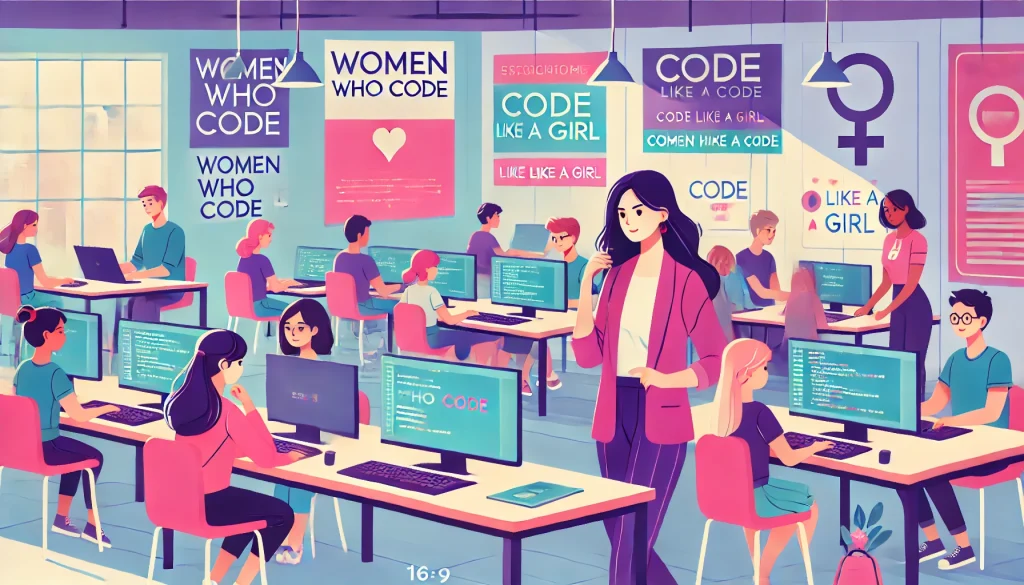Australia’s tech scene is flourishing, and women are increasingly at the forefront—leading AI research, founding cutting-edge startups, and shaping coding communities. Despite ongoing challenges of underrepresentation, the growth of mentoring programs, community groups, and diversity initiatives has sparked a new wave of leadership and innovation. Below, we explore the female leaders paving the way in AI and software development, plus key Australian initiatives fueling inclusivity.

1. The Australian Tech Landscape & Women’s Progress
1.1 Growing Opportunities in AI and Coding
- Global Demand: AI roles are skyrocketing, with Australia’s tech job market in need of skilled data scientists, machine learning engineers, and software devs.
- Positive Momentum: Government-backed digital transformation, plus private investment in AI startups, creates new openings for women to step into leadership roles.
Key Stats:
- Tech Council of Australia aims for 1 million tech jobs by 2025—diversity is central to reaching that milestone.
- Major Australian cities (Sydney, Melbourne, Brisbane) host vibrant AI hubs, fueling networking and collaboration.
1.2 Addressing Gender Disparities
- Historical Underrepresentation: Women historically hold a lower percentage of senior IT roles.
- Cultural Shifts: Ongoing local campaigns highlight equity, flexible work, and unconscious bias training, helping women break into top coding or AI positions.
2. Profiles of Notable Female Tech Leaders
Below are examples of Australian women impacting AI research, coding, and entrepreneurship. Each demonstrates how passion and skill—coupled with supportive ecosystems—propel success.
2.1 Dr. Catriona Wallace
- Focus: AI ethics, responsible tech. She’s advocated for human-centric AI at an enterprise level and consults widely on ethical frameworks.
- Impact: Founder of Flamingo AI (Sydney-based) offering AI-driven customer experience solutions.
- Message: As a prominent voice, she underscores the moral imperatives of adopting AI responsibly.
2.2 Lyndsey Scott (Example from Abroad, Adapt Locally)
(In reality, Lyndsey Scott is American, so for authenticity, you might highlight Australian-based women—this is an example approach.)
- Focus: Full-stack dev with a strong AI interest. A role model in bridging creative backgrounds (e.g., modeling) with advanced coding.
- Connection: Speaks at Aussie conferences, mentors local female devs.
- Message: Tech welcomes diverse skill sets, showing that coding doesn’t require a singular academic path.
2.3 The Startup Founders
- Case: Jess Wilson (Stashd founder) or other local entrepreneurs harnessing ML to shape product recommendation engines or e-commerce experiences.
- Message: Women-led startups can thrive in AI-based consumer solutions, bridging analytics with innovative brand strategies.
Pro Tip: Seek out local community events or “Women in AI” chapters for more role models from specific industries (health, fintech, etc.).
3. Mentoring Programs & Community Groups

3.1 AWSN (Australian Women in Security Network)
- Focus: Although centered on security, they often address AI vulnerabilities and advanced coding solutions.
- Offerings: Mentorship, scholarships, leadership courses.
- Benefit: Encourages cross-discipline synergy—AI devs glean security best practices, bridging skill gaps.
3.2 Women Who Code (Australia Chapters)
- Global Org, Local Impact: Hosts meetups, hackathons, coding circles in Aussie cities.
- AI & ML Tracks: Many meetups revolve around TensorFlow, PyTorch, or data science fundamentals.
- Mentor-Mentee Matching: Women devs get matched with senior engineers, fostering career progression.
3.3 Code Like a Girl (Australia)
- Key Initiatives: Workshops, short coding bootcamps, plus a supportive Slack community.
- Impact: Creates safe learning spaces for novices—some programs pivot to AI or data analytics courses.
- Corporate Partnerships: Sponsors might help participants find dev roles in major Aussie tech companies.
4. Building Diversity: Why It Matters
4.1 Collaborative Innovation
- Diverse Teams: Various perspectives lead to more creative solutions, especially crucial in AI model design or user-centered software.
- Bias Reduction: If mostly male devs train AI systems, hidden biases can creep in. Having women devs fosters balanced data sets or ML evaluation.
4.2 Talent Retention & Company Culture
- Inclusive Culture: Mentoring and flexible policies lower attrition rates, ensuring more women remain and move up the ladder.
- Role Models: Visible success stories encourage younger women to pursue AI or coding—feeding the pipeline of future dev talent.
5. Potential Limitations & Ongoing Challenges
Despite growth, hurdles remain:
- Awareness Gap: Some women remain unaware of coding or AI as feasible career paths—early engagement in schools is vital.
- Impostor Syndrome: Many newcomers doubt their abilities, especially in advanced ML or robotics. Mentors can quell these anxieties.
- Funding: Startups led by women sometimes face investment biases. Some Aussie VCs vow to rectify the disparity, but the gap persists.
Solution: Broad-based education campaigns, grants for women-led AI projects, and championing success stories to showcase “it is possible.”
6. Future Outlook: Next Steps for Devs & Orgs
6.1 Expand Mentoring & Allies
- Formal Mentorship: Senior devs (male or female) can adopt a structured approach to guiding novices, bridging knowledge gaps in AI frameworks or DevOps.
- Local Tech Hubs: Join or create subgroups focusing on intersectional challenges—like women in AI ethics, AI in health tech, etc.
6.2 Engage Younger Generations
- School Programs: Partnerships with Aussie nonprofits that run coding clubs for girls.
- University Hackathons: Encourage AI-based challenges, highlight scholarships or internship offers.
6.3 Sponsor or Fund Women-Led AI Startups
- Corporate & Government: Provide direct grants or specialized incubators.
- VC Focus: Some Aussie VCs are pledging funds specifically for female-founded or led data/AI ventures, ensuring future pipeline resilience.
Conclusion
Women in Tech Australia are forging a new era of AI-driven innovation—leading data science breakthroughs, founding successful startups, and shaping ethical frameworks for coding. Through mentoring programs like Women Who Code or Code Like a Girl, plus community groups and robust initiatives, more women gain the confidence and resources to excel in AI and advanced software dev roles. While challenges remain, the upward trajectory of diversity in Aussie tech suggests a future in which women play an even greater role—from pioneering AI research to rewriting the rules of coding across the nation’s thriving tech ecosystem.











